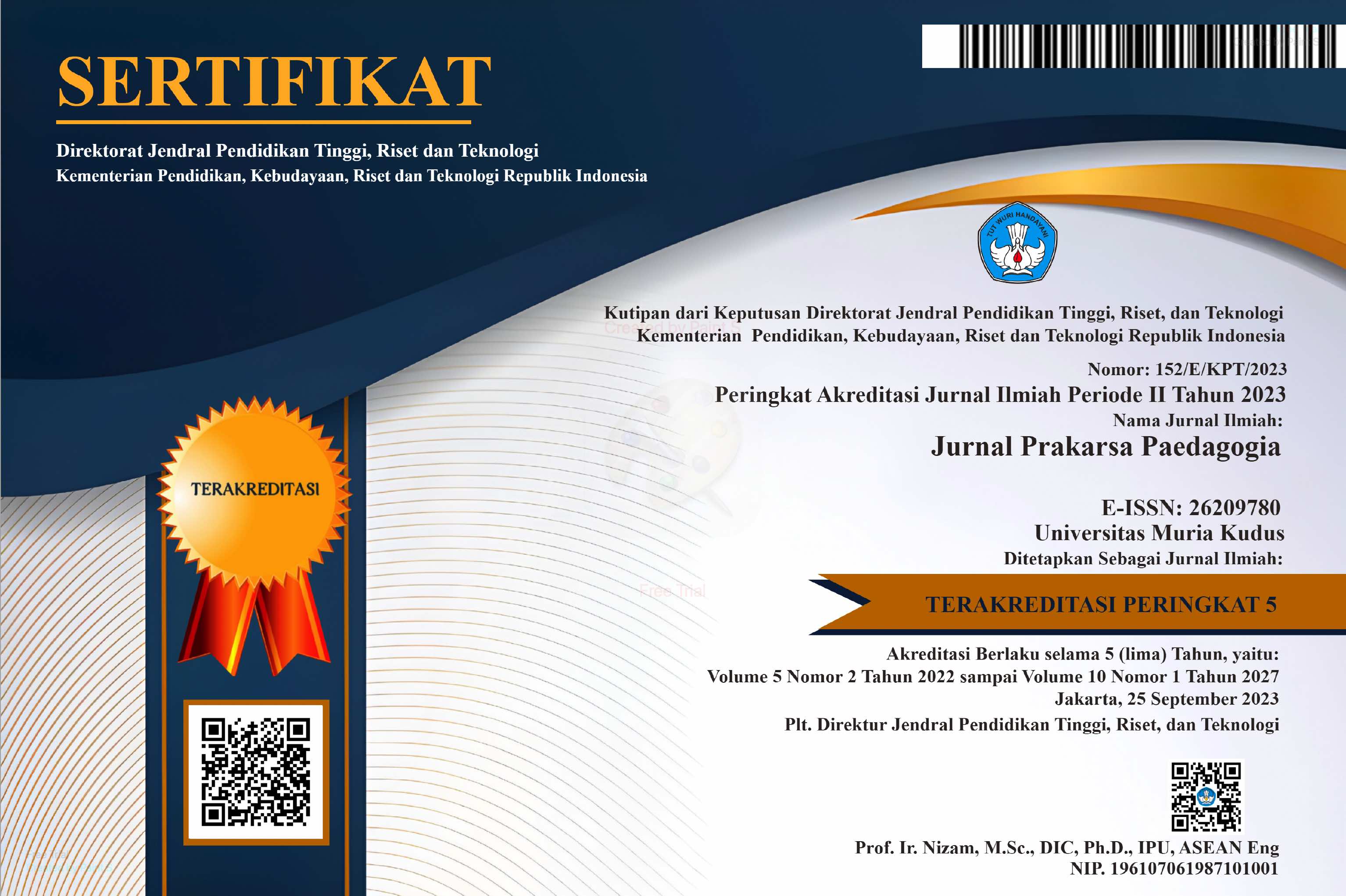Pentingnya Mental Tangguh Di Masa Transisi Pandemic Covid-19
Abstract
Artikel ini bertujuan untuk menjelaskan pentingnya model pembelajaran mental tangguh pada masa transisi pandemi corona berbasis media sosial di Indonesia. Dalam rangka mengembangkan kesehatan mental dan membentuk mental yang tangguh, yang diperlukan dimasa krisis khusunya yang telah dialami yaitu pandemi corona, maka dilakukan model pembelajaran mental tangguh pada masa pandemi corona berbasis media sosial di Indonesia. Manfaat model pembelajaran mental tangguh pada masa pandemi corona ini dengan pelaksanaan psikoedukasi dengan memberdayakan individu, keluarga, maupun komunitas. Guna menemukan, menjaga, dan mengoptimalkan kondisi sehat mentalnya dalam menghadapi kehidupan sehari-hari walaupun dimasa krisis penyesuaian transisi pandemi corona.
Keywords
Full Text:
96-100 (Bahasa Indonesia)References
Agung, Ivan Muhammad (2020) Memahami Pandemi COVID-19 dalam Perspektif Psikologi Sosial. Fakultas Psikologi Universitas Islam Negeri Sultan Syarif Kasim Riau. Psikobuletin: Buletin Ilmiah Psikologi Vol. 1, No. 2, Mei, 2020 (68 – 84) Banerjee D. (2020). The COVID-19 outbreak: Crucial role the psychiatrists can play. Asian J. Psychiatr. https://doi.org/ 10.1016/j.ajp.2020.102014 Dong L, & Bouey J (2020). Public mental health crisis during COVID-19 pandemic, China. Emerging Infection Diseases.7, 23- 26 https://doi.org/10.3201/eid2607.200407 Dewi, Kartika Sari. (2012). Kesehatan Mental. Semarang. UPT UNDIP Press Semarang Enriquez, M. A. S. (2014). Students ’ Perceptions on the Effectiveness of the Use of Edmodo as a Supplementary Tool for Learning. DLSU Research Congress. https://doi.org/10.1017/CBO9781107415324.004 . Frost, D. M. (2011). Social stigma and its consequences for the socially stigmatized. Social and Personality Psychology Compass, 5(11), 824-839. DOI: 10.1111/j.1751- 9004.2011.00394.x Fauziyyah, R., Awinda, R. C., & Besral, B. (2021). Dampak Pembelajaran Jarak Jauh terhadap Tingkat Stres dan Kecemasan Mahasiswa selama Pandemi COVID19. Jurnal Biostatistik, Kependudukan, dan Informatika Kesehatan, 1(2), 113-123. Gunawan, A., & Bintari, D. R. (2021). Psychological Well-Being, Stress, and Emotion Regulation in First Year College Student during COVID-19. JPPP-Jurnal Penelitian dan Pengukuran Psikologi, 10(1), 51-64. Kurniasari, E., Rusmana, N., & Budiman, N. (2019). Gambaran umum kesejahteraan psikologis mahasiswa. Journal of Innovative Counseling: Theory, Practice, and Research, 3(02), 52 58. Link, B.G & Phelan, J.C (2001). Conceptualizing Stigma.Annual Review of Sociology, 27, 363 385. Ryff, C. D. (2014). Psychological well-being revisited: Advances in the science and practice of eudaimonia. Psychotherapy and psychosomatics, 83(1), 10- 28. So, S. (2016). Mobile instant messaging support for teaching and learning in higher education. Internet and Higher Education. https://doi.org/10.1016Zj.iheduc.2016.06.001 Kumar, V., & Nanda, P. (2018). Social Media in Higher Education. International Journal of Information and Communication Technology Education. https://doi.org/10.4018/ijicte.2019010107 Tan BY, Chew NW, Lee GK, et al. Psychological Impact of the COVID-19 Pandemic on Health Care Workers in Singapore. Ann Intern Med. 2020; [Epub ahead of print 6 April 2020]. doi: https://doi.org/10.7326/M20-1083 Taylor.S,E, Peplau,L.A & Sear, D.O , (2009). Psikologi Sosial Jakarta:prenada group Vibriyanti, Deshinta (2020) Kesehatan Mental Masyarakat: Mengelola Kecemasan Di Tengah Pandemi Covid-19. Pusat Penelitian Kependudukan, Lembaga Ilmu Pengetahuan Indonesia Jurnal Kependudukan Indonesia. Edisi Khusus Demografi dan COVID-19 69 74 Wang , C , Pan, R , Wan, X 1 , Tan, Y, Xu, L 1 ,. Ho,C.S & Roger C. Ho, R.C(2020). Immediate Psychological Responses and Associated Factors during the Initial Stage of the 2019 Coronavirus Disease (COVID-19) Epidemic among the General Population in China., International.Journal of Environment Research and . Public Health, 17, 1729; doi:10.3390/ijerph17051729 Wise, T., Zbozinek, T., Michelini, G., Hagan, C. C., & Mobbs, D. (2020). Changes in risk perception and protective behavior during the first week of the COVID-19 pandemic in the United States. PsyArXiv Preprints. doi: 10.31234/osf.io/dz428. Zhang, D., Zhao, J. L., Zhou, L., & Nunamaker, J. F. (2004). Can e-learning replace classroom learning? Communications of the ACM. https://doi.org/10.1145/986213.986216 Zhang,X, Wang, F 3 , Zhu, C & Wang, Z (2020), Willingness to Self-Isolate When Facing a Pandemic Risk: Model, Empirical Test, and Policy Recommendations .International. Journal of Environmental. Research and. Public Health, 17, 197; doi:10.3390/ijerph17010197
DOI: https://doi.org/10.24176/jpp.v5i1.8138
Refbacks
- There are currently no refbacks.
Copyright (c) 2022 Jurnal Prakarsa Paedagogia

This work is licensed under a Creative Commons Attribution-NonCommercial-ShareAlike 4.0 International License.
Visitors of the Paedagogia Prakarsa Journal Status
Country of Origin of Visitors:
Jurnal Prakarsa Paedagogia dari Fakultas Keguruan dan Ilmu Pendidikan Universitas Muria Kudus is licensed under a Creative Commons Attribution 4.0 International License.
Dedicated to:







